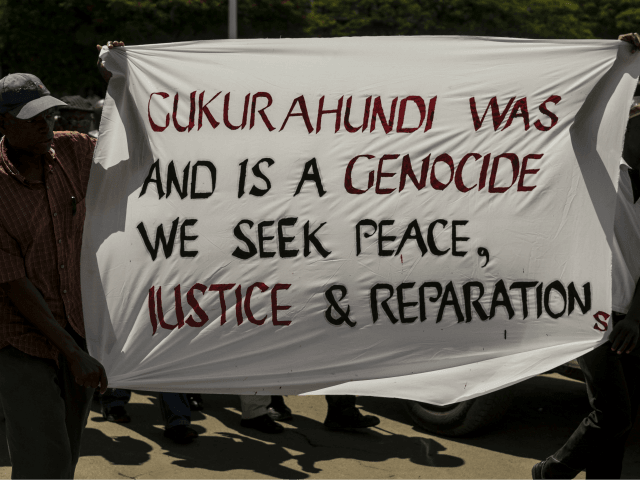Police in Zimbabwe blocked activists representing the estimated 20,000 Ndebele tribe people killed in a 1980s genocide known as “Gukurahundi” from bringing a case to court against the current government for its role in the event on Tuesday, claiming their attempt to request a permit for their assembly was illegal.
The activists had written a court petition urging Zimbabwe’s High Court to accept a case to investigate the role several leaders of the ruling Zanu-PF party, including President Emmerson Mnangagwa, played in organizing the targeted killing Ndebele people, considered political enemies of former dictator Robert Mugabe and his (and Mnangagwa’s) Shona tribe. They insist they had requested a permit to organize at the courthouse in Bulawayo where they attempted to file their case, though police claimed they had not done so early enough to allow processing.
Bulawayo is currently the center of unrelated riots and protests against Mnangagwa’s government for an exorbitant fuel price hike instituted last week that made Zimbabwe’s the most expensive gasoline in the world. Mnangagwa recently returned to Zimbabwe, canceling a scheduled trip to the World Economic Forum in Davos, Switzerland, as rumors of impeachment and gross human rights violations against protesters began to circulate.
The newspaper New Zimbabwe reported Tuesday that Mnangagwa’s government deployed riot police and “besieged” a congregation of dozens of peaceful activists seeking justice for those killed during the Gukurahundi massacres. The organizers insist that their only plan was to file a petition demanding compensation from the current government for the survivors of the campaign and the families of those murdered. They could not file their case, or complete their peaceful march from Bulawayo City Hall to the courthouse, as police detained anyone attempting to do so.
“All we wanted was to take our petition to the High Court so that the judiciary can set up an inquest into the Matebeleland genocide,” Charles Thomas, the protests organizer and a survivor of a Mugabe torture camp set up during the Gukurahundi campaign, told New Zimbabwe. He criticized Mnangagwa for announcing that he would “set a commission of inquiry” over deaths during the protests last week when deaths from nearly four decades ago remain unresolved.
“We submit this petition for inquest into the Gukurahundi genocide as survivors of this genocide,” the petition reportedly reads. “We demand justice for families of survivors, victims. From 1983-1987, Zimbabwe committed second genocide and there has been no redress for us.”
While not materially related to the protesters’ cause, the ongoing riots against the fuel hike that has made gasoline prices rise to $12 a gallon in the country may have triggered the overwhelming police response to the Gukurahundi advocates. Main opposition leaders and members of the clergy called for a peaceful “walkout” of life in Zimbabwe’s major cities, resulting not just in businesses shutting down but in organized assembly. Police responded by using live fire against the protesters, killing at least six and injuring dozens of others. Police have also reportedly gone door-to-door in places like Bulawayo and Harare, the capital, looking for protesters and dragging anyone suspect out of their homes, a human rights violation. Riots have followed police violence, as protesters have attempted to put together roadblocks to deter activity and pressure the government.
“Gukurahundi,” a Shona word meaning the rain that washes away unusable foliage before the planting season begins, was the name Mugabe gave to the military’s North Korea-trained Fifth Brigade. In 1983, Mugabe ordered the brigade to attack and kill supporters of the opposition Zapu party, nearly all of them Ndebele people. Survivors call the attacks a “genocide” because the orders led to the indiscriminate killing of tens of thousands of Ndebele people, not merely those who disagreed with Mugabe’s rule.
Mugabe has repeatedly denied any role in the killings, instead claiming that Zapu fabricated them or that a small number of soldiers went rogue. Others within Zanu-PF have blamed “the West” generally for fabricating claims against Mugabe. Mugabe later blamed Mnangagwa for the killings after a dispute with then-First Lady Grace Mugabe force Mnangagwa into exile, then into using the military to oust both Mugabes and take the presidency. Video evidence has surfaced showing Mnangagwa apparently helping to line up victims for killing during Gukurahundi. Reports also identify him as the speaker in audio at the time comparing Ndebele people to cockroaches and other vermin
Documents recently unveiled in 2015 showed Mugabe, however, directly involved in the leadership of the genocide with Mnangagwa.
The campaign is believed to have continued for four years, concluding in 1987.
Under Mugabe, police were free to use violence to silence those who wished to speak out on the Gukurahundi crimes. Mnangagwa has appeared less concerned with suppressing the matter, though the incident Tuesday clearly indicates his government has no intention of allowing any legal action against those responsible. Some activists have also claimed that, unlike Mugabe’s Zanu-PF, Mnangagwa’s party has eschewed violence against Gukurahundi survivors, but attempt to bribe some leaders into silence.

COMMENTS
Please let us know if you're having issues with commenting.